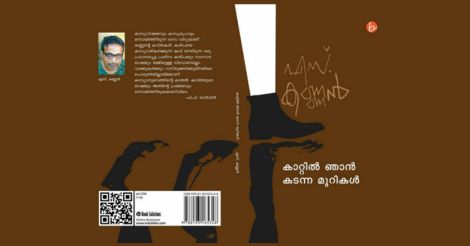Poetry is that genre in Malayalam literature that has been undergoing tremendous changes in the recent decades. While many look at it from a peripheral point of view, that the sea change in the form of poetry was a mere shift from strictly metrical verse to the free verse, those who follow the literary form find more that was changed.
Not only in form, but in the choice of themes and style of narrative also Malayalam poetry has been going through an unprecedented age of experiment post 1990s. Subtlety, a safe distance from larger narratives and a love for the visual sense became the key words. Silence overtook sloganeering in poetry even as it turned more political.
S. Kannan is one of those poets whose works suit these qualities of the new poetry of the literate land. Thus Kannan's latest book "Kaattil njan kadanna murikal", (The rooms I entered with the wind) – a collection of 500 poems – in a sense, mark a specific period of Malayalam poetry that keeps on evolving.
Precise visuals is a phrase that could easily describe Kannan's poems. The poems apparently stemmed from very personal experiences of the poet of being alone and in company, and in hometown and away, vividly recreating experiences more inwardly than outwardly.
They are a celebration of the seen as Dr P.P. Raveendran observes in the preface to the anthology. Right from the first poem in the book, "Madhura, Meenakshi, Chuvarchithrangal", (Madhura, Meenakshi, murals) this quality of the poet to recreate what was seen in all its hues is evident. (No illustrations, for I'm afraid the poetry's definition with regard to translation may come true in that case).
At the same time, a reader with some experience in Malayalam poetry may find injustice in labelling Kannan's poetry as mere word pictures. They definitely go beyond that and at times redefine the experience of seeing. "Kannukalkku thiranju nadakkunnu" (In search of eyes) is an instance for the poet's technique of merging visual experience with other sensual experiences. In other words, seeing becomes an inner experience in many of Kannan's poems.
The poet seems to not go by the school of thought that states, good poetry is that which appeals to the reader's heart at the earliest. Instead, Kannan's poems demand a certain amount of the process of thinking from his reader. Even as addressing an audience by standing firm on the grounds of present, the poems sometimes tend to turn to the history of the land where they were born. “Panamattom”, named after the poet's native place is an instance. The poet's ruminations over the past and a search for an identity as a social being is clearly evident in the poem.
Even as mostly being a conversation within oneself, the poems never go totally away from the outer world, which is made of contradictions and binaries. “Lottery” is one of the poems that clearly shows the poet's concern for those who are on the peripherals of society.
'Balloonkaran' looks to this reader a signature poem in the collection, as it carries many of the traits of Kannan's poetry – precision of visuals, recollection of the past and an inevitable interpretation of the seen. I hope the poem evokes the same emotion in any given language.
While “Interview,” a unique poem in the collection, spits out the poet's anger and spite towards the civil society politics of the contemporary times, “Gaza” carries the essence of the poet's politics. In it, we see a poet empathising with the victims of the age-old conflict. The poem shows a sky which is crisscrossed with air routes.
In “Kithaykkunna rahasyam” (Panting secret) the poet says “Poetry is neither compassion nor hope. Nor is it a yell like that of an alarm. It is that one moment before the loud cry one makes when the slowly moving darkness fades.”
Still it needs not be the strict definition of poetry that the poet believes in. In Kavikalodu” (To poets), the poet says: Do not sit over to write poem/ with sleepy eyes./A beast should be awakened amid trees/while waiting for poetry..."
That beast, which must be another name of vigilance, is highly awaken in the poems sealed in “Kaattil njan kadanna murikal.” They also demand the presence of a similar beast in the reader's head.

























 Kaattil njan kadanna murikal by S. Kannan
Kaattil njan kadanna murikal by S. Kannan
Disclaimer
The comments posted here/below/in the given space are not on behalf of Manorama. The person posting the comment will be in sole ownership of its responsibility. According to the central government's IT rules, obscene or offensive statement made against a person, religion, community or nation is a punishable offense, and legal action would be taken against people who indulge in such activities.